|
|
|
Sort Order |
|
|
|
Items / Page
|
|
|
|
|
|
|
| Srl | Item |
| 1 |
ID:
172844
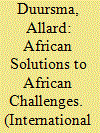

|
|
|
|
|
| Summary/Abstract |
The current scholarly literature on the international mediation of civil wars draws predominantly on a rationalist-materialist perspective. This perspective suggests that the ticket to mediation success is the material manipulation of the bargaining environment by third parties with a high degree of economic and military resources. I argue that legitimacy also determines outcomes of mediation because if a mediator has legitimacy, it can continue to look for a mutually satisfactory outcome and try to pull the conflict parties toward compliance. I show that legitimacy matters by systematically comparing the effectiveness of African and non-African third parties. African third parties are typically considered ineffective because of a low degree of economic and military capacity. However, they effectively mediate civil wars in Africa because of a high degree of legitimacy, which is a result of a strong conviction within the African society of states that African mediation is the most desirable type in conflicts there. Drawing on data from the Uppsala Conflict Data Program supplemented with unique data, which together cover all mediation efforts in Africa between 1960 and 2017, I find quantitative evidence supporting the effectiveness of African third parties. Compared to non-African ones, African third parties are far more likely to conclude negotiated settlements that are more likely to be durable. African third parties are especially effective if the conflict parties are highly committed to the African solutions norm. Theoretically, this study deviates from much of the literature that puts forward solely rationalist-materialist explanations of mediation success. By bringing legitimacy to the forefront, this article supplements the current mediation literature that emphasizes material sources of power and ignores social structures.
|
|
|
|
|
|
|
|
|
|
|
|
|
|
|
|
| 2 |
ID:
155690
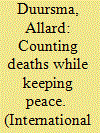

|
|
|
|
|
| Summary/Abstract |
This article assesses the Joint Mission Analysis Centre's (JMAC) field information and analysis capacity through systematically comparing JMAC's data collection in Darfur to an event-level conflict dataset based on open-source information. This comparison shows that JMAC's data collection in Darfur over the studied period is much more comprehensive and precise than any publicly available data on conflict events currently available. In addition, this article demonstrates how peacekeeping data could be used to guide the leadership of peacekeeping missions.
|
|
|
|
|
|
|
|
|
|
|
|
|
|
|
|
| 3 |
ID:
178210
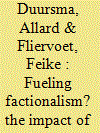

|
|
|
|
|
| Summary/Abstract |
While peace processes increase the likelihood that a civil war is resolved, they can also complicate peace by increasing the risk of rebel fragmentation. In this article, we argue that negotiations exacerbate pre-existing structural and substantial divisions within rebel organizations, therefore increasing the likelihood of a rebel split. More specifically, we put forward a theoretical framework that specifies why factions within a rebel group may disagree with the onset of negotiations, the conclusion of a peace agreement, or the implementation of an agreement—and thus break away during the peace process. We empirically assess the merit of this framework by systematically comparing the impact of these phases in a peace process on the fragmentation of rebel organizations. Using data that more accurately reflect the moment a rebel split takes place than earlier studies, we find that peace processes have a greater substantial impact on rebel fragmentation than previously assumed.
|
|
|
|
|
|
|
|
|
|
|
|
|
|
|
|
| 4 |
ID:
158921
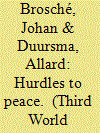

|
|
|
|
|
| Summary/Abstract |
Why do some peace agreements end armed conflicts whereas others do not? Previous studies have primarily focused on the relation between warring parties and the provisions included in peace agreements. Prominent mediators, however, have emphasised the importance of stakeholders at various levels for the outcome of peace agreements. To match the experience of these negotiators we apply a level-of-analysis approach to examine the contextual circumstances under which peace agreements are concluded. While prominent within the causes of war literature, level-of-analysis approaches are surprisingly scant in research about conflict resolution. This article compares two Sudanese Peace Agreements: the Comprehensive Peace Agreement (2005) that ended the North–South war and led to the independence of South Sudan, and the Darfur Peace Agreement (2006) which failed to end fighting in Darfur. We find that factors at the local, national and international level explain the different outcomes of the two agreements. Hence, the two case studies illustrate the merit of employing a level-of-analysis approach to study the outcome of peace agreements. The main contribution of this article is that it presents a new theoretical framework to understand why some peace agreements terminate armed conflict whereas others do not.
|
|
|
|
|
|
|
|
|
|
|
|
|
|
|
|
| 5 |
ID:
166684
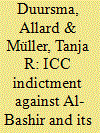

|
|
|
|
|
| Summary/Abstract |
The impact of the International Criminal Court (ICC) on peace processes has received much scholarly attention. We argue, based on the ICC arrest warrant against Sudanese President Omar al-Bashir, that ICC indictments against government officials not only can be detrimental to the prospects for peace, but can also negatively affect everyday practices of peacekeepers and humanitarian workers. We draw on a combination of quantitative and qualitative data in order to develop our argument. We interrogate some measurable consequences of the indictment in relation to the work of the United Nations – African Union Mission in Darfur (UNAMID) as well as humanitarian actors in Darfur. We do so using a data set compiled to support the work of UNAMID. We also draw on interviews with UN and UNAMID staff, aid workers, and representatives of the conflict parties. Our analysis shows that the indictment of President al-Bashir was perceived by the Sudanese government as the continuation of a confrontational approach pursued by the international community. We further show that the indictment accelerated patterns of obstruction and intimidation of peacekeeping actors, other third-party actors, and local staff associated with these. This complicated the everyday activities of peacekeepers and humanitarian efforts.
|
|
|
|
|
|
|
|
|
|
|
|
|
|
|
|
| 6 |
ID:
194061


|
|
|
|
|
| Summary/Abstract |
This article examines how host-state consent affects the implementation of different sets of Protection of Civilians (POC) activities. Given the centrality of POC to UN peacekeeping, it is therefore important to understand the factors impacting its implementation. We argue that effectively conducting POC-activities – including supporting state capacity-building, human rights reporting, physical protection, and supporting dialogue – hinges on host-state consent. Based on an analysis of UNMISS and MINUSCA, this article provides support for our argument that the quality of host-state consent can significantly affect the implementation of UN peacekeepers’ POC-activities, but shows that such impacts are not necessarily uniform across different sets of efforts.
|
|
|
|
|
|
|
|
|
|
|
|
|
|
|
|
| 7 |
ID:
159146
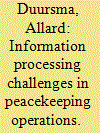

|
|
|
|
|
| Summary/Abstract |
Information analysts are often hindered by uncertainty, complexity, ambiguity, and equivocality when trying to support peacekeeping operations. This article puts forward a conceptual framework that explains what each of these information challenges entails and how uncertainty, complexity, ambiguity, and equivocality hamper peacekeeping efforts. To assess the conceptual value of linking these information challenges to peacekeeping efforts, this article zooms in on the information support system within the United Nations Multidimensional Integrated Stabilization Mission in Mali (MINUSMA), though other cases are also considered. The peacekeeping information collection and analysis efforts in Mali illustrate that peacekeeping missions ideally should be equipped with the capacity to overcome information challenges related to uncertainty and complexity in order to support the tactical and operational level of peacekeeping missions. In order to understand decision-making context and support the strategic level, it is also important that information analysts within peacekeeping mission can reduce information challenges related to ambiguity and equivocality. The importance of understanding the decision-making context speaks to the emphasis on sequenced mandates in the High-level Independent Panel on Peace Operations (HIPPO) report. In order to timely adjust the mandate of a peacekeeping mission, the leadership of a peacekeeping mission needs to be alerted of any changes in the decision-making context.
|
|
|
|
|
|
|
|
|
|
|
|
|
|
|
|
| 8 |
ID:
165681
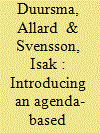

|
|
|
|
|
| Summary/Abstract |
Previous quantitative mediation research has relied on generalized measurements of “mediation success,” such as agreements, ceasefires or peace durability. However, these measurements of success do not take into account what mediators were mandated to achieve. We propose benchmarking outcomes against the explicit mandates of the interventions, a novel way of conceptualizing mediation success. Utilizing data on the agendas of mediated negotiations in intrastate armed conflicts in Africa between 1990 and 2010 as a proxy for mediation mandates, we examine the relative effectiveness of manipulation as a mediation strategy. The study shows, in contrast to previous research, that third party manipulation does not have a significant effect on whether the goal of a given round of negotiations is achieved and, that under some circumstances, may decrease the likelihood of mediation success. We discuss the opportunities as well as limitations of a mandate-based approach to the study of mediation success.
|
|
|
|
|
|
|
|
|
|
|
|
|
|
|
|
| 9 |
ID:
196001


|
|
|
|
|
| Summary/Abstract |
This data feature introduces a new dataset to study peace processes to end organized armed violence in Africa: the African Peace Processes (APP) dataset. The APP dataset includes observations on both mediated and unmediated rounds of negotiations in state-based and non-state conflicts in Africa between 1989 and 2019 and builds on conflict data from the Uppsala Conflict Data Program (UCDP). The APP dataset covers peacemaking efforts in both active and inactive conflicts. Moreover, the start and end month and year of each observation are specified, giving researchers some flexibility with regard to the temporal unit of analysis they use. In addition to discussing the rationale behind the creation of the APP dataset, we explain the data collection process and show some patterns based on the data. We also illustrate how the data could be used by looking at the association between the no. of peacekeepers deployed and the onset of mediated negotiations in intrastate and non-state conflicts. We find that high no. of peacekeepers are associated with a higher likelihood of negotiations in non-state conflicts, but not in intrastate conflicts. A plausible explanation for this finding is that security concerns play a more important role in the decision to initiate negotiations in non-state conflicts than in intrastate conflicts. Our short analysis thus illustrates the value of having data on both intrastate and non-state conflicts.
|
|
|
|
|
|
|
|
|
|
|
|
|
|
|
|
| 10 |
ID:
178731
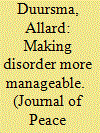

|
|
|
|
|
| Summary/Abstract |
Much of the quantitative conflict resolution literature focuses on mediation between states or on efforts to end a civil war through a comprehensive peace agreement that brings peace to the entire country. This article instead analyses the effectiveness of mediation between a wide range of armed actors on a subnational level. Utilizing unique data on Darfur covering the January 2008–August 2009 period, this article finds that mediation efforts following armed clashes in a given area significantly prolong local lulls in fighting in this area. This finding remains robust when controlling for the presence of a peacekeeping base, battle-deaths and the type of armed actors engaged in armed clashes. In addition, the finding remains robust when accounting for the non-random assignment of mediation efforts through matching similar observations in the dataset. Finally, anecdotal evidence from sites of armed conflict beyond Darfur suggest that the findings from this study might also hold in other armed conflicts.
|
|
|
|
|
|
|
|
|
|
|
|
|
|
|
|
| 11 |
ID:
155686
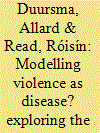

|
|
|
|
|
| Summary/Abstract |
This article explores the potential and limitations of epidemiological analyses of violence. We draw on an 18-month sample of Joint Mission Analysis Centres data to identify clusters of armed violence in Darfur and model the risk of armed clashes in space and time. We illustrate the merit of using methods from both descriptive epidemiology and analytical epidemiology to study armed conflict. We observe three interesting correlations. Firstly, that violence in one locality means it is more likely that there will be violence in a neighbouring locality in the next month. Secondly, that the presence of peacekeepers in a locality where violence has occurred means it is less likely that violence will occur in a neighbouring locality, than if peacekeepers were not present. Finally, our third observation is that the presence of peacekeepers in a given locality means it is more likely that violence will occur in that locality. Understanding how conflict occurs in space and time could contribute to the effectiveness of peacekeeping missions. This touches upon the major commonality between the efforts of peacekeeping missions and epidemiology: both are fundamentally concerned with the well-being of defined populations and both rely on data to design effective interventions.
|
|
|
|
|
|
|
|
|
|
|
|
|
|
|
|
| 12 |
ID:
193849


|
|
|
|
|
| Summary/Abstract |
While the normative development of the UN’s focus on protection of civilians is well covered, there is little research on how more than two decades of translating the norm into practice has led to the development of an entire ecosystem of early warning tools across the UN system. Most of these tools have been created at the field level, and UN Member States have neither played a role in pushing for these tools nor in helping to develop them. This article makes two contributions. Empirically, the article maps the ecosystem of early warning tools for protection of civilians in UN peace operations. Second, drawing on practice theory, the article reflects on the origin of these tools and argues that bottom-up norm implementation practices in international organizations amount to norm fixations—collectively describing what a norm is and how it should be implemented in practice.
|
|
|
|
|
|
|
|
|
|
|
|
|
|
|
|
| 13 |
ID:
180891
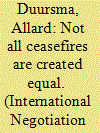

|
|
|
|
|
| Summary/Abstract |
Past research has found that third party pressure makes the signing of a ceasefire more likely, but also more likely to break down. What explains this variation? I argue that third party pressure is more likely to lead to a durable ceasefire if pressure is applied to persuade the conflict parties to continue to negotiate and produce a detailed ceasefire document, whereas pressure solely aimed at making the conflict parties sign a ceasefire document undermines the durability of the ceasefire. A comparison of four ceasefires concluded in Sudan supports this argument. Third party pressure that led to the Nuba Mountains Ceasefire and the Agreement on Security Arrangements helped move the negotiations on security arrangements forward. By contrast, the N’Djamena Ceasefire Agreement and the Darfur Peace Agreement were imposed on the parties without regard for political and technical aspects of the ceasefire. This explains why violence soon resumed.
|
|
|
|
|
|
|
|
|
|
|
|
|
|
|
|
| 14 |
ID:
165451
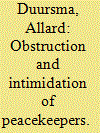

|
|
|
|
|
| Summary/Abstract |
While recent research focuses on why conflict parties attack peacekeepers, little attention has been given to other types of resistance against peacekeeping missions, such as intimidation and obstruction. It is argued in this article that one reason why peacekeepers are obstructed and intimidated is that armed actors that target civilians want to maintain the operational space to carry out attacks against civilians and want to prevent peacekeepers from monitoring human rights violations. A spatially and temporally disaggregated analysis on resistance against peacekeepers in Darfur between January 2008 and April 2009 indeed suggests that the intimidation and obstruction of peacekeepers is more likely to take place in areas with higher levels of violence against civilians. The findings hold when taking into account the non-random occurrence of violence against civilians through matching the data. Finally, anecdotal evidence from other sites of armed conflict than Darfur suggests that resistance against peacekeepers in these cases is also likely to be related to the targeting of civilians. This suggest that in order to be effective in protecting civilians, peace missions should not only be robust as highlighted in previous research, but peace missions should also develop an effective strategy to deal with armed groups that try to prevent peacekeepers from fulfilling their mandate.
|
|
|
|
|
|
|
|
|
|
|
|
|
|
|
|
| 15 |
ID:
153693
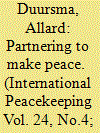

|
|
|
|
|
| Summary/Abstract |
This article systematically examines the varying effectiveness of African and non-African third parties in mediating civil wars in Africa. Drawing on data from the Uppsala Conflict Data Program, supplemented with unique data on mediation efforts, which together cover all mediation efforts in civil wars in Africa between 1960 and 2012, this article presents quantitative evidence supporting the effectiveness of African third parties. Compared to non-African third parties, African third parties are far more likely to conclude peace agreements and these peace agreements are more likely to be durable. Most effective, however, are mixed mediation efforts in which there is coordination between African and non-African third parties, but in which African third parties take the lead. The phrase, ‘African solutions to African challenges’ should thus be understood as a division of labour and responsibilities, rather than an excuse for non-African third parties to ignore Africa’s problems or African third parties acting on their own. Indeed, whilst African third parties should take the lead in mediation processes in African civil wars, non-African third parties should support these processes by lending additional strength. Through supplementing each other’s comparative advantages, African and non-African third parties can more effectively resolve civil wars in Africa.
|
|
|
|
|
|
|
|
|
|
|
|
|
|
|
|
| 16 |
ID:
193115
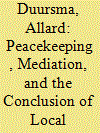

|
|
|
|
|
| Summary/Abstract |
This article theorizes on how military and civilian components of peacekeeping operations contribute to the conclusion of local ceasefires in non-state conflicts involving armed opposition groups or communal groups. A mediation-based logic suggests that civilian peacekeeping staff can provide technical support aimed at resolving the conflict issues and engage with state officials to promote peace. A capabilities-based logic suggest that military peacekeepers can provide security during the negotiations, arrange logistics, and put military pressure on the conflict parties, which all should make the conclusion of a ceasefire more likely. The analysis supports both the capabilities-based and the mediation-based logic. An instrumental variable estimation helps to account for endogeneity. This article contributes to the literature on peacekeeping, mediation, and ceasefires through shifting the focus to non-state conflicts.
|
|
|
|
|
|
|
|
|
|
|
|
|
|
|
|
| 17 |
ID:
185837
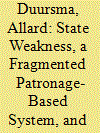

|
|
|
|
|
| Summary/Abstract |
There is an academic consensus that addressing the local cleavages that drive armed conflict through local peacemaking is crucial to building peace. However, several studies also suggest that local peacemaking is often unsustainable without the conclusion of a national-level elite pact. This article moves this debate forward by arguing that even if an elite-level pact is in place, a lack of connections between national-level elites and local conflict parties can prevent peace from trickling down from the national level to the local level. This argument is demonstrated by looking at national-level and local peacemaking efforts in the Central African Republic. Although several national-level peace agreements have been concluded in the Central African Republic, extreme state weakness and a highly fragmented patronage-based system have prevented national-level peacemaking efforts from having a positive impact on local peacemaking efforts in the Central African Republic. This article contributes to the literature on conflict resolution in Africa. Many studies have focused on the local peace process, yet the national-level context in which these local peace processes take place is only rarely considered.
|
|
|
|
|
|
|
|
|
|
|
|
|
|
|
|
| 18 |
ID:
153699
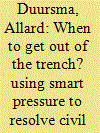

|
|
|
|
|
| Summary/Abstract |
This article puts forward a theory of smart pressure, which emphasises that third-party pressure only works if the conflict parties under pressure can agree with the endpoint of this pressure. Hence, a potential mutually acceptable agreement needs to be formulated before a mediator starts to apply pressure. To this argument, this article employs two case studies: the mediation efforts leading up to the Sudan Comprehensive Peace Agreement concluded in 2005 and the Darfur Peace Agreement concluded in 2006. These cases support the smart pressure theory and suggest that mediators need to be modest about what they can accomplish using pressure.
|
|
|
|
|
|
|
|
|
|
|
|
|
|
|
|
|
|
|
|
|